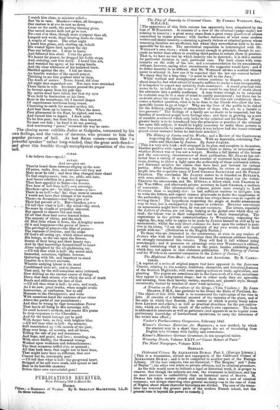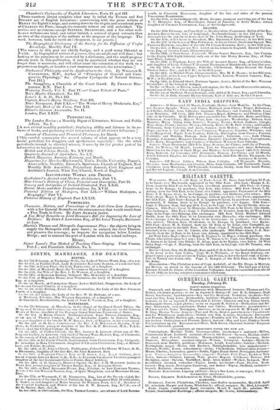PUBLICATIONS RECEIVED,
From February 24th to March 2d.
Boosts.
Titian; a Romance of Venice. By R. SHELTON Mncitatrers, LLD. In-threw-volumeu
The Plea of Insanity in Criminal Cases. By FoRaEs WreisLow, Esq., M.R.C.S.L.
[The appearance of this little volume has apparently been stimulated by the case of M'NeciaTEN. It consists of a view of the criminal (judge-made) law relating to insanity ; a great many cases from a great many quarters of crimes committed by insane persons; with further instances of what some modern writers call moral insanity,—meaning a grossly vicious or criminal person whose reasoning faculties are unaffected, but whom they nevertheless hold to be irre- sponsible for his acts. The anecdotical exposition is intermingled with Mr. Winnow's own views ; which are sound enough in principle, though he suc- ceeds no better than others in enabling third parties to reduce them to practice. That is, we have no test by which insanity can be detected; it is still a matter for particular decision in each particular case. The book closes with some remarks on the state of the law, and a recommendation for its amendment, without, however, saying what amendments the suggester would have: and if to define insanity be so difficult, that Mr. WINSLOW advises a medical witness never to attempt it, how can it be expected that the law can succeed better? We fancy that for a long time " it must be left to the Jury." While medical and metaphysical writers continue to dispute, not merely about insanity, but what extent of insanity suffices to render a man irresponsible, it is hopeless to expect any certainty from enactment. A sound practical rule seems to be, to hold no one insane if there would be any kind of doubt about his admission into a public madhouse. A man insane enough to be subjected to restraint may be in a state of mind to justify punishment ; but there can be no doubt about the matter if he is not. Still were this rule established, there comes a further question, what is to be done to the friends who allow the irre- sponsible insane to go at large ? Why are the lives of the public to be risked for the delicacy, negligence, or misconduct of those who are to a lunatic in loco parentis? The feelings of a family are no doubt to be respected, but the families of murdered people have feelings also ; and there is growing up a sort of maudlin sentiment which only looks to the criminal and he friends. If any greater laxity is to be introduced into the principles or practice of the criminal law upon this subject, it would be highly necessary to make those persons in some way amenable to justice whose duty it was to have had the insane criminal placed under restraint before he had done mischief.] The History of Junius and his Works ; and a Review of the Controversy respecting the Identity of Junius. With an Appendix, containing Por- traits and Sketches by Junius. By JOHN JAQUES. [This is a very able book ; well arranged in itaplan, and complete in its matter, whether positive with regard to such absolute facts as dates, or inferential—as whether JUNIUS was or was not a lawyer. Besides a full history of the letters and the concurring circumstances of their publication, Mr. JAQUES has col- lected from a variety of sources a vast number of scattered facts and illustra- tions, tending to throw a light upon the authorship of these celebrated letters, and discussed seriatim the claims that have been put forward for various parties. After briefly dismissing the improbables, he enters at considerable length into the respective cases of Lord GEORGE SACKVILLB and Sir PHILIP FRANCIS. The conclusion Mr. JAQUES comes to is founded on BUTLER'S, with some addition. It is that Lord GEORGE SACKVILLE was the writer, FRANCIS the amanuensis, and Mr. D'OrLy, a fellow-clerk with FRANCIS in the War-Office, and afterwards private secretary to Lord Gisoaos, a medium of connexion. The circumstantial evidence points more strongly to Lord GEORGE than to anybody else : he had sufficient motives to instigate him to write the letters, and cogent reasons afterwards to desire the suppression of the authorship: the question in our minds has always been—was he capable of writing them ? The hypothesis respecting the single or double amanuensis; may be true, but is unsupported by reason or evidence. However convenient an amanuensis might have been, he was not necessary. The letters, esy the Letters of Junius, are not long, looking at the period over which ey ex- tend; the labour was in their composition, not in their transcription. The expressions in the private communications to W000rem. respecting the copying, &c., may refer to copies to be made by JUNIUS himself as well as by an amanuensis; whilst the only direct evidence we have upon the subject is posi- tive in its terms, "I am the sole depository of my own secret, and it shall perish with me." (Dedication to the English Nation.) To those who are interested in the controversy, or even to any readers of Junius who wish for further information than the common editions furnish, we strongly recommend this volume. They will find it full without being overcharged ; and it possesses an advantage even over WOODFALL'S edition, in only containing what is essential to the point, besides exhibiting much which does not appear in that elaborate publication. The History of Junius and his Works is an essential companion to the Letters of Junius.] The Highland Note-Book ; or Sketches and Anecdotes. By R. CA.RREI• TREES.
[A reprint of a series of original papers that have appeared in the Inverness Courier, relating to the scenery, traditions, characters, and historical;features of the Scottish Highlands, with some passing notices on trade, agriculture, and planting. The papers are sometimes set in the framework of a tour, sometimes they appear in an independent shape; but in either mode they are agreeable and amusing, from their brevity, variety, anecdote, and pleasant style, though occasionally dashed by touches of mere word-spinning.] A Treatise on the Pot-culture of the Grape, (Vitis Viuifera.) By Joan MEARNS. F.H.S., late gardener to his Grace the Duke of Portland, &c. [The object of this little book is to recommend the cultivation of the vine in pots. It consists of a botanical account of the varieties of the plant, and of the soils in which they flourish, (the matter of which is pretty freely taken from LOUDON and others,) as well as practical directions for the pot-cultiva- tion, which are chiefly the result of the author's own experience. The book is addressed to amateurs as well as gardeners ;and appears to us to require some preliminary knowledge of horticultural operations, to carry the directions of i the writer into effect.]
Tracher's Parliamentary Companion, February 1843.
Klauer's German Exercises for Beginners ; a new method, by which the student may in a abort time acquire the art of translating from English into German with facility and correctness.
Klauer's Miniature German Grammar, in ten synoptical tables. Waverley Novels, Volume XXIV.—" Count Robert of Paris." The Novel Newspaper, Volume XIII.
SERIALS.
Celebrated Crimes. By ALEXANDER Dumas. Part I. (Foreign Library.) [This is a translation, revised and expurgated, of the Celebrated Crimes of ALEXANDER DUMAS ; and is to be completed in another part of the Foreign Library. Of the four subjects, two are historical, " The Borgias," and " Joan of Naples"; the other two relate to private offences, and to criminal procedure. As the title would seem to indicate a legal or historical work, it is proper to observe, that though the subjects are real, the treatment is fictitious, and has no more pretence to authenticity than an historical novel of Sco-rT. M. DUMAS has taken certain events and turned them into a sort of criminal romance ; not always observing even general accuracy—as in the case of Joan of Naples, about whose character historians are divided. The care of the trans- lator has removed the grosser parts of the modern French school, but the general tone ia beyond his power to remedy.] C7iambers's Cyclopcedia of English Literature, Parts 11. and III. [These numbers almost complete what may be called the Tunon and first STUART age of English Literature : commencing with the prose writers of BEISRY the Eighth's reign, and coming down to the elegaic and occasional poets of CHARLES the First ; though the dramatic writers are still unfinished. The notices and specimens-except SPENSER, SHARSPERE, and a few other well- known writers-are brief, and rather furnish a series of elegant extracts than an idea of the characters of the authors or the progress of the language. The work. however, both for merit ani cheapness, is sui generis.] The Biographical Dictionary of the Society for the Diffusion of Useful Knowledge, Monthly Part IX.
The names in this part are chiefly foreign, and a good many Oriental or jewish. As biographical notices of persons, they are ample and well done ; but looking at the .purposes to be answered by a dictionary, and the small progress already made in this publication, it may be questioned whether they are not longer than is necessary, and will either cause the extension of the work to a preposterous length, or involve a curt treatment towards the termination.] Mechanical Philosophy and its Application to the Arts. By WILLIAM B. CARPENTER, 111.D, Author of "Principles of General and Com- parative Physiology," &c. (Popular Cyclopmdia of Natural Science, Part III.) The Smugglers • a Chronicle of the Coast Guard. By FRANCIS MG- HINSON, R.N. Part I.
Waverley Novels, Vol. V. Part IV.-" Count Robert of Paris." Roes Martin Chuzzlewit, No. Ill.
Lover's L. S. D., Pint Ill.
Captain Knox's Harry Mowbray, Part III.
Novel Newspaper, Part LXI.- The Works of Henry Mackenzie, Esq." Stephens's Book of the Farm, Part XIL Klauer's German Amaranths, No. IL London, Part XXIV.
PERIODICALS.
The London Review ; a Monthly Digest of Literature, Science, and Public Affairs. No. I.
[ A new critical monthly periodical; displaying ability and fairness in its re- views of books, and professing strict independence of all sinister influences ] Annals of Chemistry and Practical Pharmacy, for March.
[This number commences the second volume of what appears to be a very useful periodical fur druggists and apothecaries especially : like the other periodicals devoted to chemical science, it owes by far the greater part of its tufiwmation to foreign sources.]
British and Foreign Review, No. XXVII L Quarterly Journal cf. Agriculture, No. LX.
British Magazine, January, February, and March.
Magazines far March-Blackwood's, Tait's, Dublin University, Fraser's, Anise orth's, Monthly, Farmer's, Sportsman. Church of England, New Monthly Belle Assemblde, Polytechnic Journal, Civil Engineer and Architect's Journal, What Not, Church, North of England.
ILLUSTRATED WORKS AND PRINTS.
Gailltabatl's Ancient and Modern Architecture, Part VI.
Miss Corner's History of China, Pictorial and Descriptive, Part IL Scenery and Antiquities of Ireland illustrated, Part XXII. British Moths and their Transformations, No. XV II. Pictorial Edition of Shakspere, Part LII.-" William Sbakspere, a
Biography," Part 'VI.
Pictorial History of England, Part LXXII.
PAMPHLETS.
Character, Motives, and Proceedings of the Anti-Corn-Law Leaguers; with a few General Remarks on the consequences that would result from a Free Trade in Corn. By JOHN ALMACK junior. A Few Brief Remarks on Lord Denman's Bill for Improving the Law of Evidence. By JOHN J. LOWNDES, Esq., of the Inner Temple, Barrister- at-Law.
Martin's Thames and Metropolis Improvement Plan: the objects being to supply the Metropolis with pure water ; to embank the river Thames, and preserve the sewerage ; to improve the navigation below London Bridge; and to connect the port of London with the inland railways.
Music.
Signor Lanzi's New Method of Teaching Class-Singing. First Course, Part I.; and Pianoforte Addition, No. I.



























 Previous page
Previous page